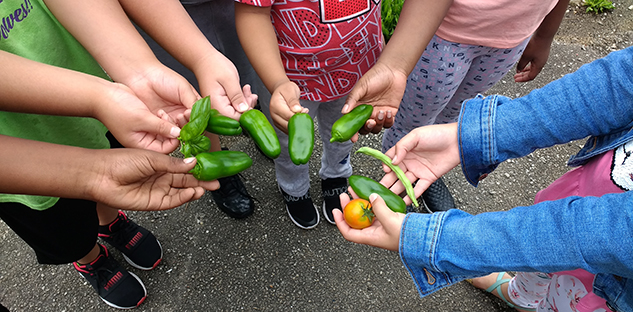
Sowing Social/Emotional Growth with a School Garden
By John Casey | November 2021

“Life begins the day you start a garden.”
– Chinese proverb
– Chinese proverb
 Even before the pandemic, many of my students spent a great deal of time indoors, playing video games, surfing the internet or avoiding violence in the streets. Remote learning increased that trend, with many spending hours a day in front of a screen. Lots of research shows that children who spend less time outside struggle with personal and social development.
Even before the pandemic, many of my students spent a great deal of time indoors, playing video games, surfing the internet or avoiding violence in the streets. Remote learning increased that trend, with many spending hours a day in front of a screen. Lots of research shows that children who spend less time outside struggle with personal and social development.Returning to in-person learning has reduced some of that screen time, but the required safety measures to protect everyone from COVID-19 continue to create challenges that impact social development. For example, students can only interact with classmates in the same “pod” and meetings in the school counselor’s office can be awkward with face masks and social distancing. With all the stress our students have experienced, I wanted to find a calming space where I could work with students to reduce the stress. I found that in a school garden.
I was fortunate to have a number of abandoned planter boxes at our school. Last spring, I got permission from our administration to use them, and during hybrid learning, instead of meeting with students in my office, I began taking them outside. We would talk as we pulled weeds, added new soil, planted seeds and watered plants. We began to walk the grounds to pick up litter and discovered birds building nests in the trees and near the building’s rain gutters. Eventually we began to harvest flowers, green beans, peppers, tomatoes and lettuce. The outdoor space works wonders getting kids to open up. The gardening tasks we do also increase their sense of achievement, ownership and belonging to the school community. For students coming from homes overwhelmed by pandemic stress, learning about growing food that can contribute to the family diet has helped students feel empowered.
To continue the experience over the winter, I recently asked the fifth-grade teachers to consider composting their students’ food scraps from lunch. I received a compost bin from another school and the teachers recommended a student to help me assemble it. This student was returning from a two-day suspension. He did not want to be back in school and did not want to see the counselor. However, when he realized what I was asking him to do, he readily joined me. In moments we were talking about how he helped his dad fix cars, his grandmother’s garden and what composting means. After he returned to the classroom, he thanked his teachers for suggesting he help me, and told one of them, “Thank you for believing in me.”
The school garden has changed the way I work with students, facilitating a new way to build relationships. It has provided an opportunity to truly enhance our comprehensive school counseling program. I encourage everyone to begin getting students outdoors. You don’t need an established gardening space to begin – even a single planter box will do. Discover the possibilities and enjoy!
Resources:
- Got Dirt? Garden Toolkit from the Wisconsin Department of Health Services
- Roots Watering Hole podcasts with Orrin Williams and Dr. Akilah Martin
- Student growth within the school garden: Addressing personal/social, academic and career development, Journal of School Counseling
- Screen Time and Children, American Academy of Child and Adolescent Psychiatry, Facts for Families No. 54